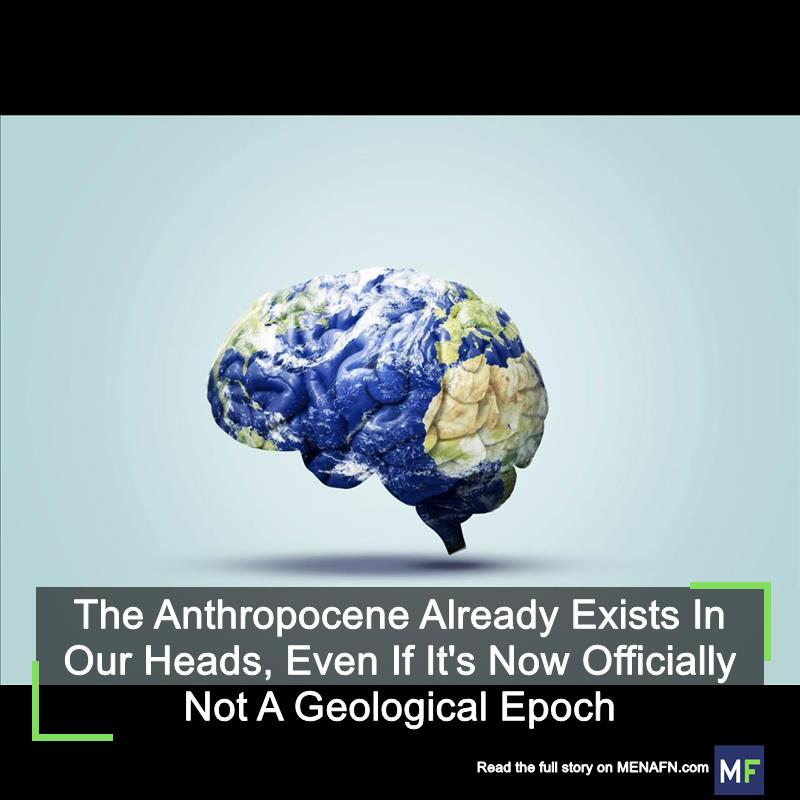
The Anthropocene Already Exists In Our Heads, Even If It's Now Officially Not A Geological Epoch
That may seem a long time given climate change concerns, but it is of course far less than a blink in planetary terms. The Earth can certainly wait, even if we can't.
But sometimes big ideas like the Anthropocene take time to find meaning in our lives and perhaps their answer. How do I know? Let me tell you a story.
Nine years ago, I was in Munich visiting friends. We went on a family outing to the Deutsche Museum, a world class celebration of technology and engineering in a vast building on an islet of the River Isar. The entrance was framed on either side by very tall vertical banners, fluttering in the breeze.
Each blue-green banner had an image of the Earth with a thumbprint overlay. And in bold white lettering, variously:“Welcome to the Anthropocene / Willkommen in Anthropozän”. The subtitle read:“The Earth in Our Hands”.
Willkommen. Kevin Collins
I had to forgo the exhibition because my family wanted to see just about everything else. But even as I stood on the steps at the entrance, with my young son clutching my hand, it struck me as a curious title.
Why would anyone welcome anyone to the Anthropocene? Who would really want to go to that party? The invitation was, well, distinctly uninviting.
Why 'welcome'?I have thought about this troubling invitation on and off in the intervening years. Was“welcome” being ironic or even cynical perhaps – an invitation of despair and inevitability? But that contradicted the ethos of the museum and the academic Rachel Carson Centre which co-hosted the exhibition, where insight, learning and practical science are celebrated. So my question has remained: why“welcome”?
I finally realised an answer during a recent conversation with my PhD student Houda Khayame who is building on work between myself and colleague Ray Ison to explore how systems thinking and acting in the Anthropocene might improve governance of our environment . We were talking about how geologists have been searching for a“golden spike” in the mud or soil or Earth's geological record as evidence of the Anthropocene ever since the term was popularised in 2000.
Read more: Dawn of the Anthropocene: five ways we know humans have triggered a new geological epoch
I found myself advising that the only thing that really matters about the Anthropocene is that it reframes ourselves as a part of the human-earth dynamic. The evidence for the Anthropocene is not in the soil or mud. The golden spike is to be found in our heads. It is in the way we think about our human relationship to the Earth.
As soon as I had said it, I realised I had found the answer to the invitation that had been patiently waiting for a reply many years before in Munich. The invitation was to welcome the Anthropocene in a positive sense because until we do, we will not be in a position to alter our thinking to address the global agendas we face as we change the planet.
To welcome the Anthropocene as an idea is to reframe our relationship with the planet and move away from being recipients to active creators of the world we live in.
Humans are 'active creators of the world we live in'. Roschetzky Photography / shutterstock
In moving away from geology I would also shift terminology from“golden spike” to“golden thread” since this is both a more pleasing image if we are talking about heads and ideas and is also less dependent on the measurement and graphics of science. Importantly, a thread connects the different parts of our lives and can be extended to connect with others.
The Anthropocene doesn't depend on geologyThe geologists' rejection of the Anthropocene is understandable in their need for scientific evidence. It may seem to be a missed opportunity , but it does not really matter because how we live in and experience the world does not depend on a signal in the geology.
Indeed, even in their official rejection, the International Union of Geological Scientists noted the Anthropocene as a concept is part of popular culture , as evidenced by the museum exhibition but also various artworks and books .
The extent to which the Anthropocene really exists depends on our recognition and acceptance of the golden thread that we are all in an active back and forth relationship with the Earth. A socio-ecological relationship that has and will continue to shape our human-environment past, present and future.
Although I regretted missing the exhibition, I realise now that I did not need to see it. The banner at the entrance was enough to spark the inquiry. Accepting its welcome offers us the potential to make huge, golden strides in how we think about ourselves and our environment, and how we might live more sustainably.
Welcome, at last, to the Anthropocene.

Legal Disclaimer:
MENAFN provides the
information “as is” without warranty of any kind. We do not accept
any responsibility or liability for the accuracy, content, images,
videos, licenses, completeness, legality, or reliability of the information
contained in this article. If you have any complaints or copyright
issues related to this article, kindly contact the provider above.


















Comments
No comment